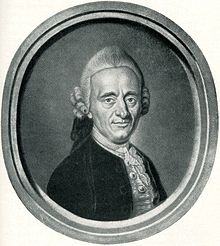Gottlieb Christoph Harleß
Adolf Gottlieb Christoph Harleß (originally Harles) (born June 21, 1738 in Kulmbach ; † November 2, 1815 in Erlangen ) was a German classical philologist , philosopher and literary historian .
Life
Harleß was the youngest son of the Kulmbach cloth maker Johann Georg Harleß and his wife Anna Schniegel. Prepared by attending the Episcopal Lyceum in Regensburg and taking private lessons from his brother, who later became vice rector, he studied theology at the University of Erlangen in 1757 . His inclination to philology moved him to move to Halle in 1759 to teach in the orphanage's Latin school . When he moved to Jena the following year , he became close friends with Christian Adolph Klotz . He learned to look at the old classics from the aesthetic side and was convinced of the need for a reform of high school teaching. He accepted a call to the philological seminar in Göttingen under the direction of Johann Matthias Gesner , who however died shortly afterwards, in 1761, but returned to Erlangen in 1763 to do his habilitation in 1764 .
Through various writings and his commitment to the Latin language and literature, he received an extraordinary professorship in the philosophical faculty in 1765. A few months later, however, he moved to the Casimirianum grammar school in Coburg as a professor of oriental languages and eloquence . There he worked for four years, during which he wrote numerous treatises.
Through a call from Friedrich Karl Alexander , he returned to Erlangen in 1770 as a full professor of poetry and eloquence, where he remained until his death.
In the last phase of his life he was no longer able to cope with the demands and the quality of his lectures, which he held until the end, suffered from his age-related reduced performance. Ludwig Tieck described him in 1793 as a friendly old gentleman who was dry and shrunken, full of stiff dignity, ... played a peculiar figure .
From 1776 to 1805, Harleß was the head librarian of the Erlangen University Library.
In 1808, Harleß was elected a member of the Bavarian Academy of Sciences .
By founding the Philological Seminary in 1777, he was one of the pioneers of the upswing that philology and humanities studies took in the nineteenth century.
From three marriages he had a total of 11 children. A son from the second marriage was Christian Friedrich Harleß (1773-1853), who described his life in 1818. A son from the third marriage was the Nuremberg merchant Johann Felix Tobias Harleß, the latter was the father of Adolf Harleß (1806–1879) and Emil Harleß (1820–1862) and the great-grandfather of Hermann Harless (1887–1961). His daughter Katharina Magdalena Isabella Harleß married Georg Wolfgang Augustin Fikenscher in 1796 .
Fonts (selection)
- Thoughts on the state of schools and their improvements . 1761
- Introductio in historiam linguae latinae . 1764
- Vitae philologorum nostra aetate clarissimorum . 1764
- Vitae philologorum, Vol. II. 1767
- Vitae philologorum, Vol. III. 1768
- Chrestomathia graeca poetica . 1768
- Chr. Cellarii orthographia latina . 1768
- Demosthenis oratio de Corona . 1769
- Vitae philologorum, Vol. IV . 1772
literature
- Iwan von Müller : Harles, Gottlieb Christoph . In: Allgemeine Deutsche Biographie (ADB). Volume 10, Duncker & Humblot, Leipzig 1879, p. 603 f.
- Liselotte Buchheim: Harles, Johann Christian Friedrich. In: New German Biography (NDB). Volume 7, Duncker & Humblot, Berlin 1966, ISBN 3-428-00188-5 , pp. 681 f. ( Digitized version ).
- Karl Bader: Lexicon of German librarians in full and part-time positions with princes, states and cities . Harrassowitz, Leipzig 1925, p. 94.
- Otto Stählin: The seminar for classical philology at the University of Erlangen. Speech given at the celebration of its 150th anniversary on December 17, 1927 . Palm & Enke publishing house, Erlangen 1928.
- Harless, Gottlieb Christoph . In: Encyclopædia Britannica . 11th edition. tape 12 : Gichtel - harmonium . London 1910, p. 955 (English, full text [ Wikisource ]).
Web links
- Literature by and about Gottlieb Christoph Harleß in the catalog of the German National Library
- Works by and about Gottlieb Christoph Harleß in the German Digital Library
- vialibri.net
- Harleß library in the ULB Bonn
Individual evidence
- ↑ H. Meyer, Ahnentafel Harleß, Dinkelsbühl 1960
- ↑ Harles . In: Meyers Konversations-Lexikon . 4th edition. Volume 8, Verlag des Bibliographisches Institut, Leipzig / Vienna 1885–1892, p. 162.
- ^ Stählin, 1928, p. 12.
- ^ Gottlieb Christoph Harleß , members of the Bavarian Academy of Sciences
| personal data | |
|---|---|
| SURNAME | Harleß, Gottlieb Christoph |
| ALTERNATIVE NAMES | Harleß, Adolf Gottlieb Christoph; Harles, Gottlieb Christoph |
| BRIEF DESCRIPTION | German classical philologist, philosopher and literary historian |
| DATE OF BIRTH | June 21, 1738 |
| PLACE OF BIRTH | Kulmbach |
| DATE OF DEATH | November 2, 1815 |
| Place of death | gain |
